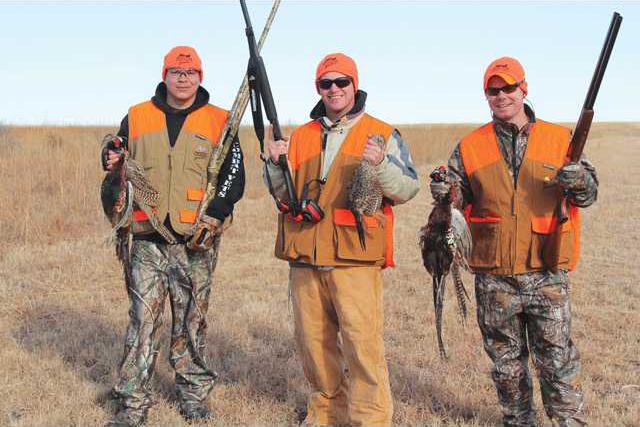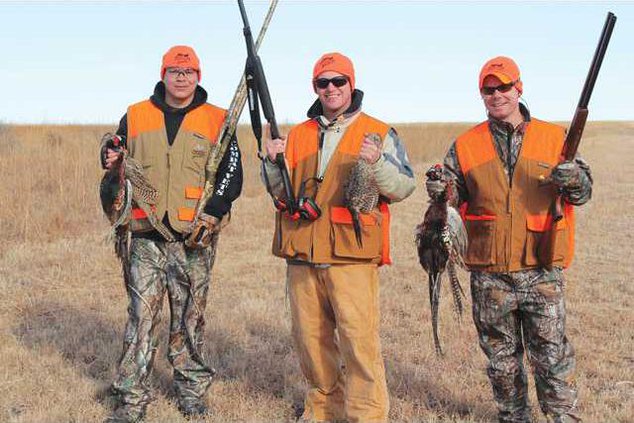Friday evening, nine men, warriors of various conflicts that have spanned a decade and a half involving America, hopped in their vehicles and began driving mostly west. They traveled interstates, two-lane highways and paved roads that eventually turned into dirt roads flanked on both sides by fields and farm houses, until they finally arrived at a lone country church, Peace Lutheran, the landmark for the last turn west that would deliver them to Hidden Hollow Lodge at Albert.
After an evening of getting to know one another and their hosts, Lynn Peterson and other members of the Pheasants Forever #504 chapter, it was off to bed to prepare for the weekend ahead.
These, participants in the 2014 Wounded Warrior pheasant hunt hosted by Chapter #504 and Crosby’s Wildgame Adventures woke to clear skies, barely a breeze, and only slightly chilly temperatures, with the forecast for the rest of the day looking increasingly good. Few could ask for a better day for hunting pheasants.
“It’s almost too good,” said Lance Crosby, co-owner of Crosby’s Wildgame Adventures.
They met at the dining table at 7:30 for coffee and breakfast prepared by PF volunteers, and headed out to the yard to warm up with some clay shooting. Then, it was out to the field for the morning hunt. The warriors were accompanied by volunteers that drove, helped with guns and shells, and carried drinks and snacks for soldiers as they began picking off the pheasants that flushed as they walked in a line through the designated fields.
By noon, 13 roosters and 12 hens had been harvested, and the dogs and men were ready to head back to the lodge for a lunch of deer chili and brats prepared by PF volunteers.
Stephen Fisher
Stephen Fisher was a high school senior at Rose Hill, a small community south of Wichita, when 9-11 happened. He spoke with a Marine recruiter right away, and after graduation, he went straight to boot camp and SOI, and was assigned to the 1st Marine Regiment-1st Battalion as an infantry rifleman where he served three deployments to Iraq. He was injured by a roadside bomb buried in the middle of the road on his third deployment, and he experienced traumatic brain injury. When he healed, he returned to the field and was hit twice more by roadside bombs. “My dad still doesn’t watch the news,” he said. “With the military, no news is good news. I remember the Marine Corps called my dad to tell him I was injured, but I didn’t want them to because I knew my dad would freak.”
Today, Fisher is a student at Metropolitan Community College in Kansas City, where he is studying behavioral health. But it’s what he was doing before that which inspired him to pursue his new field of study.
When he returned home from Iraq, he had a difficult time making the transition back to civilian life, but after a few months, he took a job with Butler County Emergency Communicatons and Lifeteam air ambulance, where he worked for the past eight years.
“It was a great transition from the military to that type of position because its structured, you follow standard operating procedures, and you have a sense of pride because you’re helping people,” he said. At first, he worked a lot of 12 hour shifts. Then, through word of mouth, he learned about the Wounded Warrior Project, and began receiving notices about events which he began taking part in. At some of these, he learned more about how his and other veteran’s brains worked, and the idea to study behavioral health was planted.
Then, about a year ago, he received a 911 call from a veteran.
“He was threatening suicide, and I was able to talk him out of it after about 35 minutes,” he said.
He got to meet the caller a few weeks later when he thanked him. Fisher credits that experience in part for his decision to pursue his studies in behavioral health.
He moved to Kansas City, and now works in communications for the U.S. Health Department with the Disaster Medical Assistance Team. At the same time, he is continuing his studies, and recently started a veterans group on campus.
Lynnwood Robertson
After eight years serving in the Air Force, Lynnwood Robertson was ready to retire from the military. After a tour in Afghanistan from 2003-2004, followed by a tour in Iraq from 2004-2005, he was suffering from Post Traumatic Stress Disorder, and the affects of a spinal injury that today still causes some paralysis along the left side of his body. However, the causal observer would be hard-pressed to notice, especially after watching him hunt Saturday morning.
“It’s really difficult,” he said. He’s still healing from a broken ankle he suffered a few months ago. “It’s one of those things — my therapy is going good, and I didn’t want to be the reason for slowing anybody down. I’m just pressing through it.”
Robertson’s wife helped turn him on to the Wounded Warrior Project. She felt it would be good for him to get together with others like him so he wouldn’t be stuck in the house, he said.
“Honestly, this has been really good therapy, and I’m really glad she went ahead and got me signed up for this,” he said. “This is a great group of guys.”
Since he returned to civilian life, he has worked with a contractor at Ft. Riley for a number of years, and recently resigned to pursue his Masters of Finance. He will finish in June, and from there, he’ll see where life takes him. His outlook on life is changing, and he credits his family — two boys, his wife of 13 years, plus his sister and her family and his parents who live within two blocks of him.
“I have a good supporting cast to help me stay strong,” he said.
He’s beginning now to expand his circle of friends, after years of staying closed off. He avoids large gatherings of people, but is easing his way back into group activities. While some WWP events include hundreds of warriors, an event like this hunt is just right for him, he said.
And now, he’s excited about hunting. While he’s familiar with target shooting, this was his first real hunt.
“I’ve never actually done anything like this, and I’d like to keep this going,” he said.
Each warrior had a unique story. And since returning, each has had a unique experience, with their own hurdles to overcome. Troy Brien, the alumni manager assigned to open the new Kansas City WWP office this coming summer helped update participants’ email and contact information so all could receive information about upcoming events. As lunch wrapped up, the warriors shared stories and joked around while the volunteers prepared for the afternoon hunt, and Peterson began preparing hors d’oeuvres for later that afternoon, and made last minute preparations for the catered dinner they would share that night.
Sunday, the hunting party would take part in a European Style pheasant hunt at the nearby barn. Volunteers took on the job of doing the dirty work, cleaning and preparing the birds for the soldiers to take home, and kitchen volunteers made sandwiches for the men to enjoy on their long drives home.
For these warriors, the weekend provided a much appreciated chance to get away and spend time in the field fellow soldiers, and talk about the issues they mutually face now that they’ve returned to the civilian world.
UPDATE: Two changes posted on 2-25-2014. Stephen Fisher spelling correction. Also, Fisher worked for Butler County Emergency Communications and Lifeteam air ambulance, not Wichita 911.
On Target
Wounded Warriors share healing, stories and the hunt at second annual WWP event





